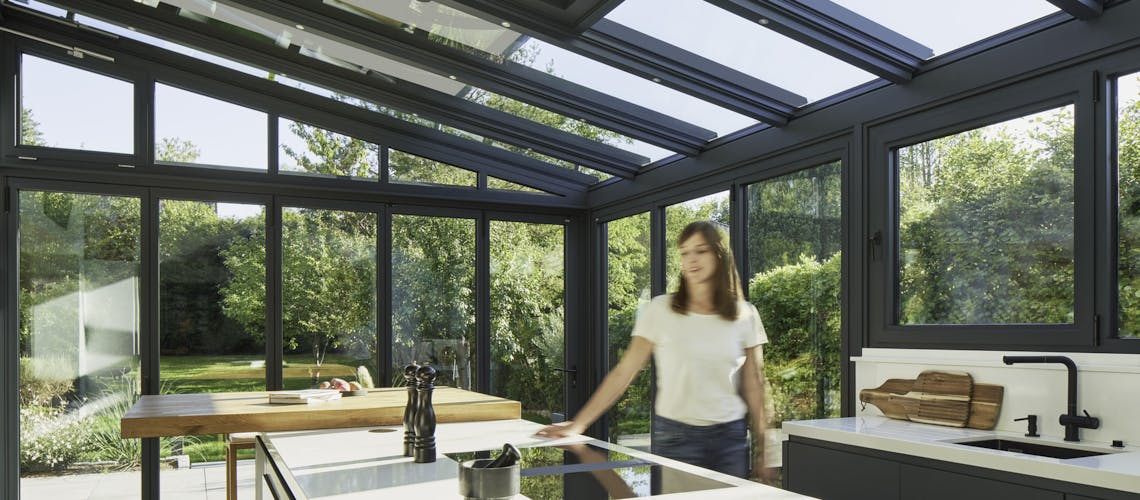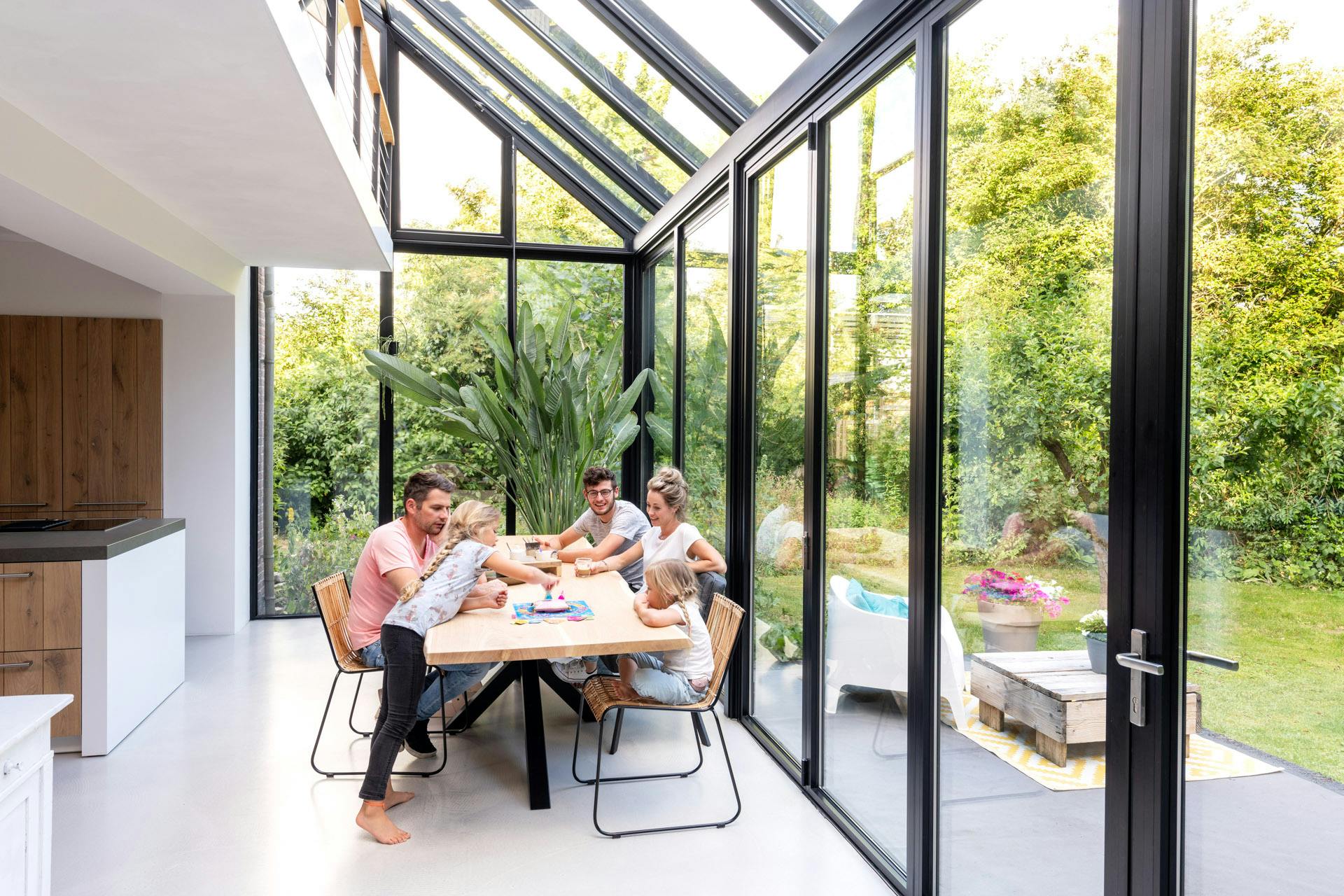"The kitchen is the hub of a home, so why not use a glass extension to open it up and flood it with natural light."
Advice choosing a glass kitchen extension

A glass kitchen extension can create the perfect dining, cooking and entertaining area that’s flooded with natural light and opens out seamlessly to your patio and garden.
The kitchen is often seen as the hub of a home, a space for family and friends to enjoy time together. Large kitchen diners are a preference for many people as they offer the ultimate integrated cooking, dining and entertaining space that everyone loves to relax in.
As one of the most important rooms in your house, your kitchen needs to be carefully planned to ensure it gives you the living space that works for you and your family’s lifestyle. And one of the best ways of creating your perfect kitchen diner is by adding an extension to your home.
Glass kitchen extension advice
Kitchen extensions can come in many shapes, styles and sizes but an increasingly popular choice is a glass extension. This is a more contemporary alternative to a traditional brick extension or a combined brick and glazed addition such as a conservatory or orangery.
A glass extension – sometimes known as a glass box extension - is a custom-made glazed structure supported with an aluminium, timber or alu-clad frame. It has a glass roof that can be sloped, vaulted or flat. Any number of opening elements can be incorporated into the bespoke design, including bi-folding doors and oversized sliding doors, along with fixed or tilt-and-turn windows.
Glass extensions use high quality materials and are designed to last a lifetime. They can be enjoyed all year round because they are thermally-broken for optimal insulation. Heating, ventilation, shading and lighting options are available. Additional features such as a weather system make your space as comfortable as possible at the touch of a button. You can also consider installing glazing with sound insulation, sun protection, burglar resistance and self cleaning features.
Thanks to their excellent thermal properties, glass extensions function like all the other rooms in your house. You can therefore use your glass extension as any kind of living area you like, but one of the most popular is as a kitchen or kitchen diner. Most people tend to expand into their garden with a glazed rear extension, but a side extension can work just as well.

A large glass kitchen extension is a great addition for growing families
"Glass extensions can work well with any style of home."
What are the benefits of a glass extension?
People love the light and spacious feel of a fully glazed extension. Because of their transparent nature, glass extensions flood your home with natural light. This transforms your living area into a bright and airy space that creates a sense of wellbeing.
They also fit in really well with the current trend for biophilic design, which aims for a sense of harmony between architectural structures and the natural world. The oversized glazing and glass roof elements give uninterrupted, panoramic views of your garden and the landscape and sky beyond.
As well as creating a sense of space inside your house, glass extensions also open up your outdoor space. They are particularly effective at removing the visual boundary between your home and your garden. They provide a seamless link from the inside of your home to the outside, allowing you to enjoy all of your living space as a whole.
Design-wise, glass extensions can work well with any style of home. They are custom made to your specifications, offering creative freedom to design something truly unique. The aluminium or timber frame can be manufactured in a huge range of colours to match your style and design. The expansive glazing lends a subtlety to the extension, which allows it to blend in with your property. Equally, you can use the frame and large glass panels to create a statement design. Glass extensions can contrast with an older property, or complement the appearance of more modern houses. Either way, they can look stunning, adding a real wow factor to your home.
Because of their light and airy appearance, glass extensions are also less visually intrusive on the character of the original building. And they have less of a visual impact on neighbouring properties and the surrounding landscape. This is why they are particularly popular for older buildings, listed buildings or those in conservation areas and national parks.
Glass kitchen extensions
An all-glass structure is a great choice for a kitchen extension. It brings together the indoors and outdoors, blurring the lines between your home and garden to create the perfect space for alfresco dining and summer soirées. With an open plan kitchen and dining area that leads out on to your garden through sliding doors or bi-folding doors, you can make the most of the warmer months and the extra space and freedom this offers.
And during less temperate months when outdoor dining is not an option, a glass extension can help you retain the sense of freedom and connection to the outside that you feel when entertaining on your garden or patio.
How secure are glass extensions?
With such a large expanse of glazing, you may be concerned about the safety and security of your home. The glass elements are certified to British safety standards or equivalent and are fully compliant with building regulations. They undergo a range of tests to ensure safety, quality and security, as well as fulfilling wind and snow load-bearing requirements. The doors are security tested too.
Read our article about glass security and safety here.
Planning permission and building regulations for glass extensions
Most glass extensions do not need planning permission as they come under Permitted Development rights as long as they adhere to certain requirements. This covers things like the size, scale and siting of your extension.
It is always advisable to check with your local planning department before starting work on an extension. Permitted Development can be different or not apply to listed homes, new builds or properties in conservation areas.
You will also need to have your glass extension signed off by your local authority to confirm it fulfils building regulations. Building regulations exist to ensure that homes are safe and healthy places to live, and cover things such as fire safety, structural integrity and ventilation. One of the things to look out for is restrictions on the proportion of glazed area to floor area, which can have an impact on the design of a glass extension and the materials used. This restriction is aimed at ensuring a good thermal efficiency for your extension, but it can often be worked around by using high performance glazing or glass extensions that are thermally broken.
Do glass extensions need foundations?
When planning your glass kitchen extension, bear in mind that it will need foundations. This will usually be designed by your structural engineer.
"The cost of your glass extension will depend on the size of your space, the complexity of the design, and the materials you use."
How much does a glass kitchen extension cost?
A glass kitchen extension will generally be more expensive than a brick extension or a traditional conservatory / orangery. If you are using your glass extension as a kitchen, you will also have to consider the cost of a larger kitchen and all the units and appliances that go with it.
As with all building work, the cost will depend on the size of your space, the complexity of the design, and the materials you use. Larger glass panels may require specialist machinery to be lifted in to place, while additional features such as smart systems can also bump up the price.
As a general rule of thumb, a glass extension is likely to cost from £3,000 per square metre, although this can vary hugely because of the bespoke nature of each structure.
The key is to choose a reputable specialist designer, manufacturer and installer of glass extensions who will offer you a high end finish that gives you the very best result for your investment, however much your budget is.
Sustainability and changes to Building Regulations Part L
On June 15th, 2022, changes to Part L of the Building Regulations will come into effect across England. These changes are designed to reduce the level of carbon emissions from buildings by 30% as part of the Government’s drive towards zero carbon by 2030.
The regulations include changes to the thermal efficiency of windows and doors, with changes to the required U-values for these in both new and existing buildings. The U-values have been upgraded and will be 1.6 W/m2k for new build properties and 1.6 W/m2k for existing ones.
Glass extensions are highly insulated, thermally broken and use high-quality sustainably sourced materials, giving them the energy efficiency required to meet the new regulations.
If you are thinking about a glass kitchen extension, our specialist team can advise on all the points made in this article. Click the button below to get in touch for a design consultation.
More Articles from Solarlux by Reveal
Loading more articles. Please wait


